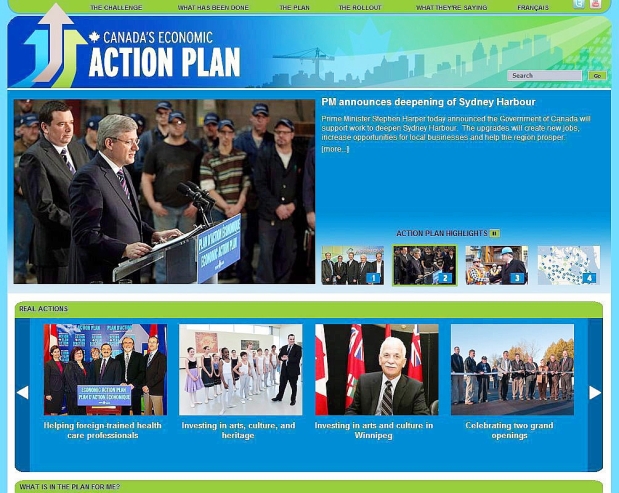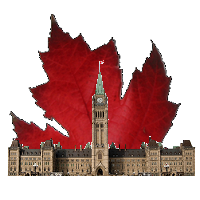
Conservatives solicit votes in emails to public servants
The Conservatives are sending public servants emails linking them to the Canada’s Economic Action Plan website and a survey which asks who they will vote for in the next election. The Union of National Defense Employees demands answer and Canadians deserve an explanation as more than $100 million in taxpayer money has been spent on propaganda while unemployment is still an issue.
Union of National Defense Employees President John MacLennan expressed concern that political parties are accessing departmental email addresses.
“If the situation had been reversed and this was a public servant accessing the government’s email addresses to contact other employees on behalf of a political party, then there would be severe consequences, up to and including dismissal,” he said.
He filed a complaint with the department’s deputy minister for human resources, Cynthia Binnington.
MacLennan wants to know how the Conservative party accessed their email addresses and how widespread the communications had become.
The emails, sent by from Conservative executive director Dan Hilton, solicited employees for information and feedback and addressed recipients saying, “The Conservative Party of Canada depends on the support and advice of Canadians like you — that’s why we’re reaching out this year with a series of online surveys.”
“We’ve accomplished a lot together in the past seven years since taking office — but our work isn’t finished yet,” the email adds
The link to the survey leads these recipients to a survey site which shows off pictures of Prime Minister Stephen Harper and advertises the Economic Action Plan. The survey goes on to ask them who they will vote for in the next election which clearly shows a conflict of interest situation and one of intimidation by employees who may not vote Conservative but fear they may lose their job because of it.
Defense Minister Peter MacKay’s spokesman Jay Paxton said as soon as the department had become aware of the emails, Conservative headquarters was contacted to remove the email addresses from the database.
“We earlier requested the party take a look at forces.gc.ca accounts,” he added.
Meanwhile, the Conservatives have spent more than $100 million in advertisements for their Economic Action Plan propaganda campaign, prompting complaints from opposition MPs and even Conservatives into wasteful spending.
The Treasury Board said the ads are supposed to inform Canadians about programs and services that are available to them.
Liberal leader Justin Trudeau slammed the advertising budget saying, “it is becoming obvious that rather than helping Canadians, the government would rather continue to spin Canadians.”
Finance Minister Jim Flaherty defended the spending on CTV’s Question Period saying that some programs vitally need to be advertised.
“Look at the jobs skills part of the budget,” he said. “I mean, this is such an important part of the budget. The number one issue in Canada today, right across the country, is employers … looking for properly trained people and people look to be properly trained so they can match the jobs.
“In terms of advertising, Canadians are entitled to know what their government in up to,” Flaherty said.
Trudeau said last week that spending on propaganda could instead be geared toward creating summer jobs for students in a time when youth unemployment is at all-time highs.
Liberal Finance Critic Scott Brison attacked the Conservatives in the House of Commons and said, “The price of one action plan ad during the playoffs could pay for 32 student summer jobs.”
Harper meanwhile dismissed opposition saying the money spent on advertising boosts confidence in the Canadian economy.
Since forming their first government in 2006, the Conservatives have spend $548 million on advertising.
A poll released in March says Canadians see the ads negatively. Of the respondents, 30% call them political, 24% call them a waste of money, and 12% call them “more commercial junk.”
Only 10% of respondents to the Forum poll, which surveyed 1,755 people of voting age with a margin of difference of 2% 19 times out of 20, thought the ads were part of the normal government routine.
The Conservatives, meanwhile have been stuffing the internet, airwaves and billboards with their ads since 2009.
Ironically, the Conservatives have done nothing better than what they accused their old rivals of. In 2006, the Conservatives said they would do business differently accusing Jean Chretien’s ads about the scandalous Sponsorship Program to be a partisan waste of taxpayers’ money.
The news yet again raises questions on the Conservatives’ economic management and highlights the theme of political interference which has surrounded the party for a while now. What do you think of soliciting emails sent to public servants? Do they pose a conflict of interest? Can they be deemed as intimidation or political interference? What do you think of Harper’s half a billion dollar ad campaign since coming into power in 2006? Have the Conservatives been hypocritical about the way they do business?




